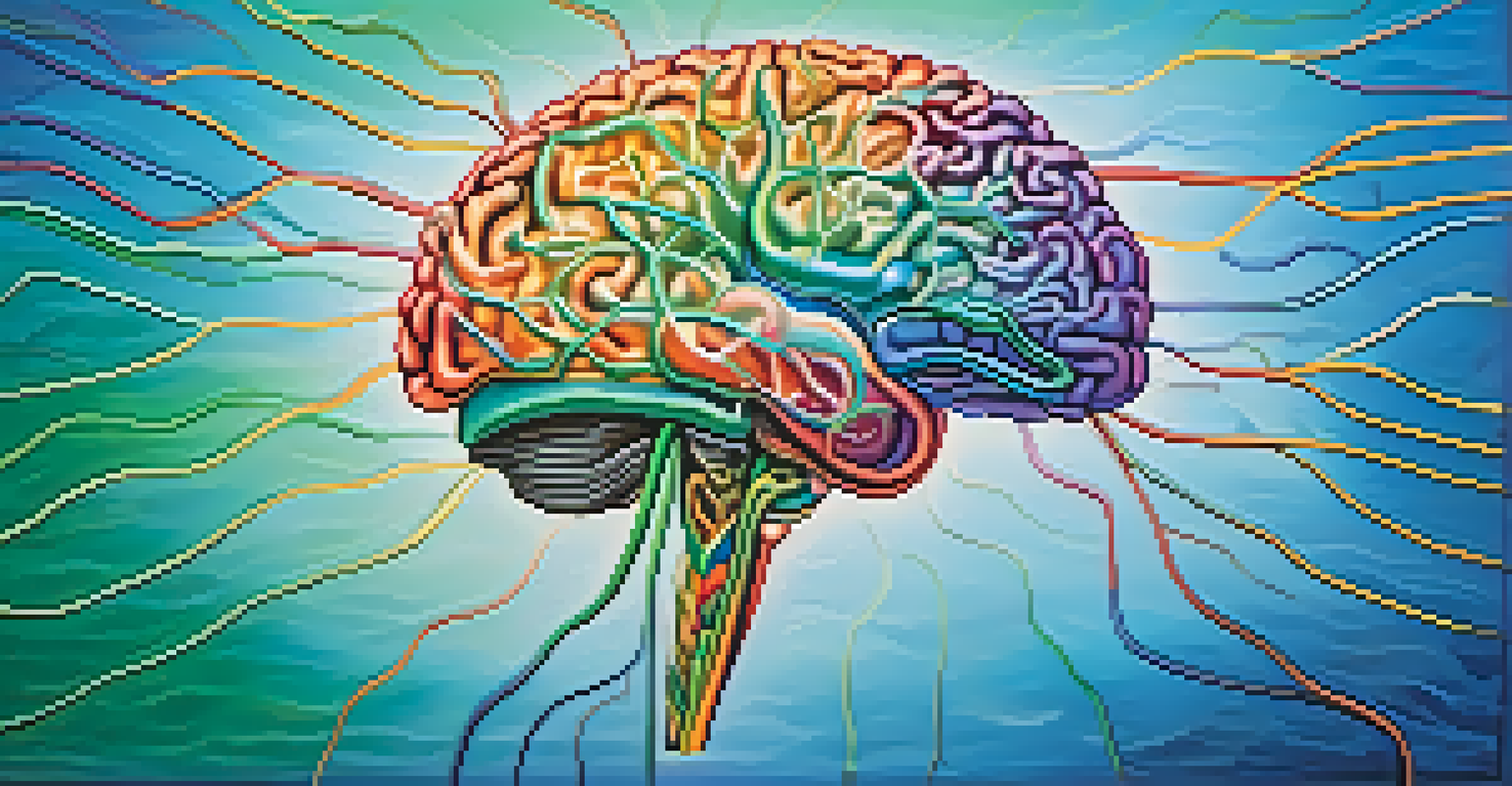Exploring the Serotonergic Pathways of Hallucinogens in the Brain

What Are Serotonergic Pathways and Their Importance?
Serotonergic pathways refer to the neural pathways in the brain that use serotonin as a neurotransmitter. These pathways are crucial for regulating mood, anxiety, and cognition. When we think about our feelings of happiness or sadness, serotonin plays a key role in that emotional landscape.
The greatest discovery of my generation is that a human being can alter his life by altering his attitude.
Understanding these pathways is essential because they influence not just mental health, but also how we experience reality. For instance, a balanced serotonergic system can lead to a sense of well-being, while imbalances are often linked to depression and anxiety. This is why scientists are particularly interested in how substances that affect these pathways can alter our perception and emotions.
Hallucinogens, substances that can cause profound changes in perception and thought, often interact with these serotonergic pathways. By exploring how they do this, we can gain insights into both the therapeutic potential of these substances and the risks involved.
The Mechanism of Action of Hallucinogens
Hallucinogens, like LSD and psilocybin, primarily exert their effects by acting on serotonin receptors in the brain. Specifically, they tend to bind to the 5-HT2A receptor, which is a subtype of serotonin receptor. This interaction can lead to alterations in perception, mood, and cognition, creating a unique experience for users.

When hallucinogens activate these receptors, they can enhance neural connectivity in certain brain regions. Picture a city where all the roads suddenly expand—traffic flows differently, and new routes become available. Similarly, hallucinogens can create new pathways of thought and perception, allowing for creative insights and a sense of connectedness.
Serotonin's Role in Mood Regulation
Serotonin significantly influences mood, and its pathways are crucial for emotional stability, with imbalances linked to anxiety and depression.
However, this powerful interaction also means that hallucinogens can lead to unpredictable effects. While some individuals may experience profound insights or feelings of euphoria, others might face anxiety or confusion. Understanding this balance is key for both users and researchers.
The Role of Serotonin in Mood Regulation
Serotonin is often dubbed the 'feel-good' neurotransmitter because of its significant role in mood regulation. An adequate level of serotonin contributes to feelings of happiness and emotional stability. When serotonin levels are low, individuals may feel more anxious or depressed—this is where the importance of serotonergic pathways becomes even clearer.
The mind is everything. What you think you become.
Hallucinogens can temporarily boost serotonin activity, which may explain their potential therapeutic effects in treating depression and anxiety. For example, recent studies have shown that substances like psilocybin can help reduce symptoms in patients with treatment-resistant depression. The potential to tap into these pathways for healing is a fascinating area of research.
However, it's essential to approach this with caution; while serotonin's role in mood is crucial, the effects of hallucinogens are complex and not yet fully understood. The balance of serotonin must be maintained, as too much stimulation can lead to adverse psychological effects.
The Therapeutic Potential of Hallucinogens
In recent years, there has been a resurgence of interest in the therapeutic potential of hallucinogens. Research indicates that when administered in controlled settings, these substances can lead to significant improvements in mental health conditions. This has prompted scientists to investigate how hallucinogens can be integrated into treatment plans, particularly for anxiety and depression.
One notable study found that patients who received psilocybin in a therapeutic environment showed lasting reductions in depressive symptoms. This suggests that the altered state of consciousness induced by hallucinogens could facilitate breakthroughs in therapy, helping individuals confront issues that may be difficult to address in traditional settings.
Therapeutic Potential of Hallucinogens
Recent research suggests hallucinogens like psilocybin can improve mental health conditions when used in controlled therapeutic settings.
While the therapeutic promise is exciting, it's essential to remember that these substances require careful handling. The environment, dosage, and individual differences all play a significant role in determining the outcomes of such treatments.
Risks and Side Effects of Hallucinogens
Despite their potential benefits, hallucinogens also come with risks and side effects. Some users may experience negative psychological reactions, such as anxiety, paranoia, or even hallucinations that lead to distress. The unpredictability of these substances is one of the reasons they are often classified as illegal in many jurisdictions.
Additionally, individuals with a history of mental health issues may be particularly vulnerable to the adverse effects of hallucinogens. For example, someone with a predisposition to schizophrenia may find that hallucinogens exacerbate their symptoms, leading to a challenging experience.
Understanding these risks is crucial for anyone considering the use of hallucinogens, whether for recreational or therapeutic purposes. It’s always advisable to approach these substances with caution and under professional guidance.
The Future of Hallucinogen Research
The field of hallucinogen research is rapidly evolving, with new studies emerging that delve deeper into how these substances interact with the brain. As stigma surrounding hallucinogens decreases, more researchers are willing to explore their therapeutic potential and effects on mental health. This wave of research opens up exciting possibilities for understanding consciousness itself.
Future studies aim to clarify the long-term effects of hallucinogen use and their potential for treating various psychological disorders. With advancements in neuroimaging techniques, researchers can now observe changes in brain activity and connectivity in real-time, providing invaluable insights into how these substances work.
Risks of Using Hallucinogens
Despite their benefits, hallucinogens carry risks, including negative psychological reactions, particularly for individuals with a history of mental health issues.
As we continue to explore the serotonergic pathways affected by hallucinogens, we may uncover new approaches to mental health treatment that harness the benefits while minimizing the risks. This journey into the brain could lead to a better understanding of both the mind and the nature of reality.
Cultural Perspectives on Hallucinogens
Throughout history, various cultures have embraced the use of hallucinogens for spiritual and healing purposes. Indigenous peoples, for example, have long used plant-based hallucinogens in rituals and ceremonies to connect with the divine or gain insight into their lives. This rich cultural history offers valuable context for understanding the contemporary resurgence of interest in these substances.
In modern times, there is a growing movement to reclaim the traditional uses of hallucinogens, particularly in therapeutic settings. As more people seek holistic approaches to health, the integration of these substances into psychotherapy is being explored with an appreciation for their historical significance.

However, it's essential to approach these practices with respect for their cultural origins. As we explore the serotonergic pathways of hallucinogens, we must also consider the ethical implications of their use in contemporary society.